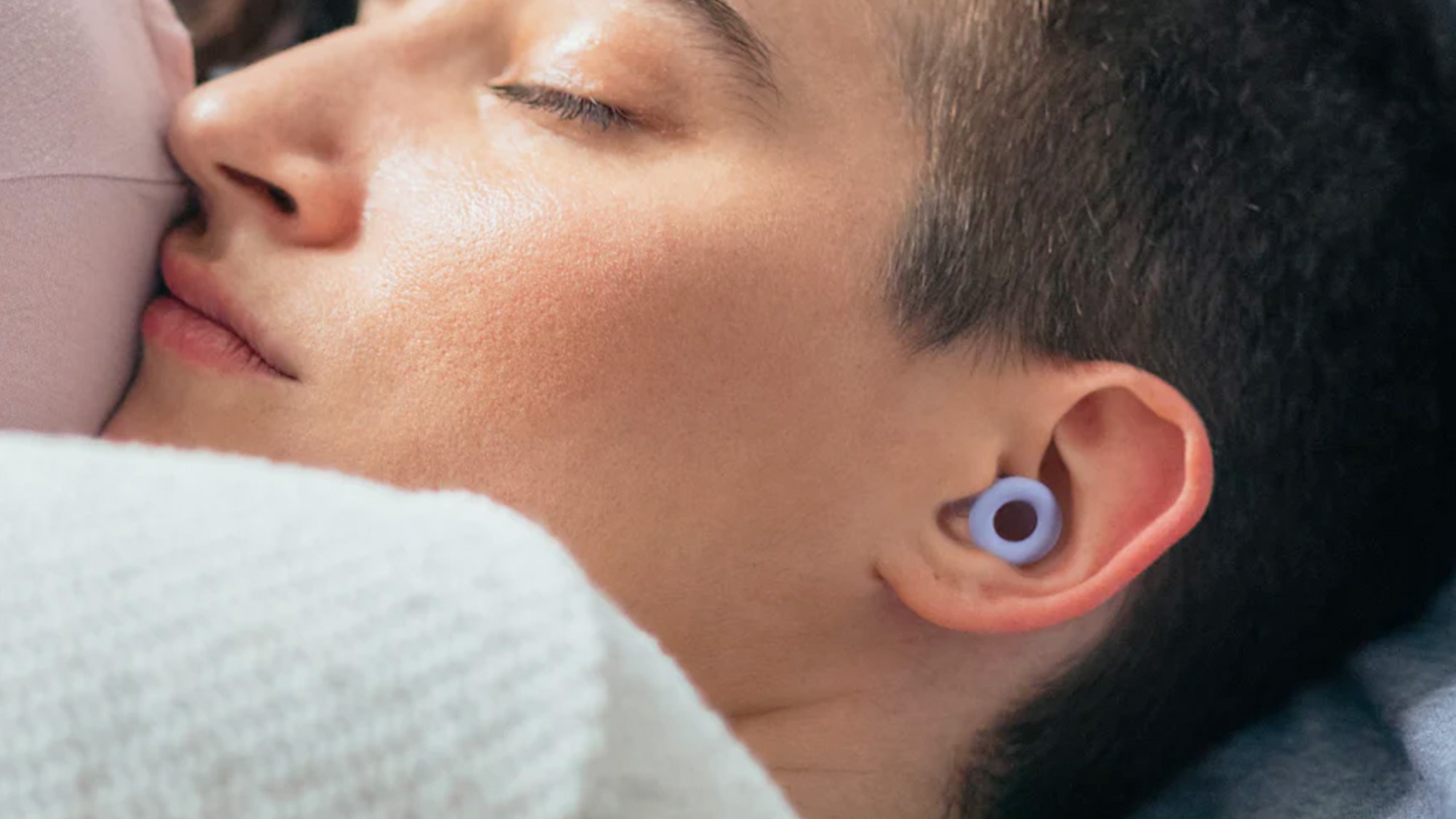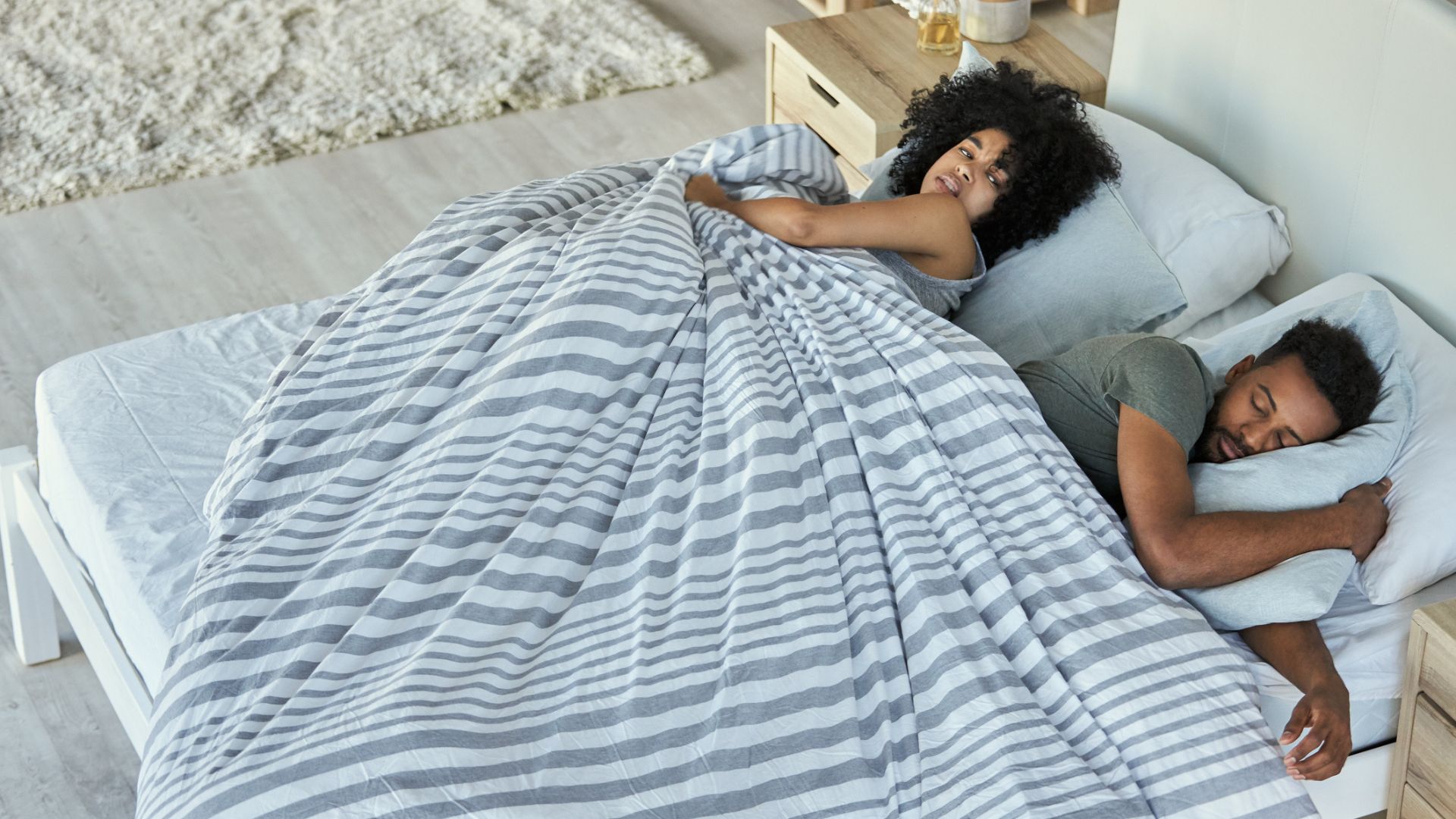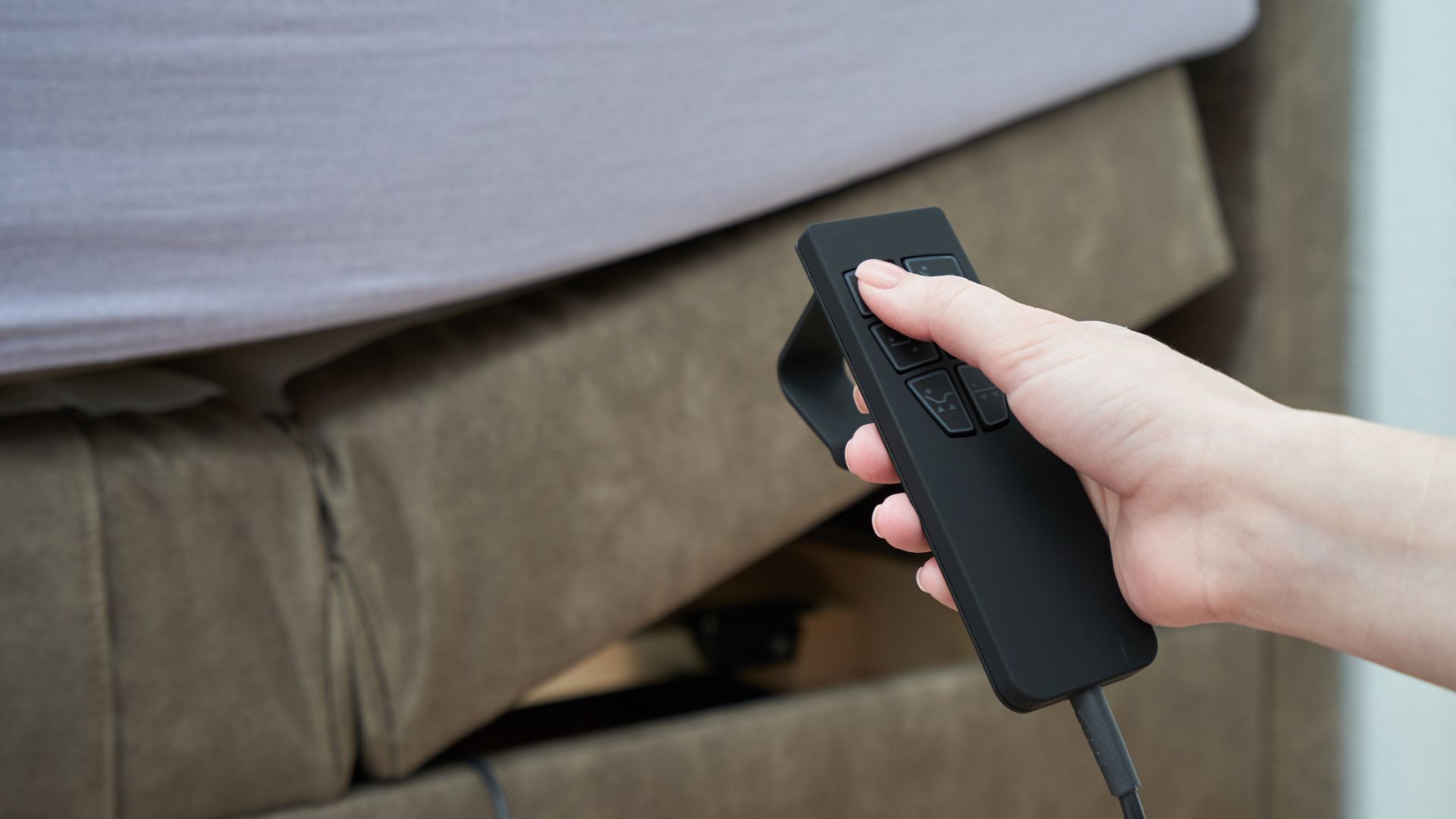How to sleep next to someone who snores, according to a specialist
Call off the sleep divorce and follow these 7 expert tips on how to sleep next to a snoring partner

A partner snoring can be more than just annoying. In fact, it can wreak havoc on our lives, with sleep deprivation having the potential to affect careers, relationships and friendships. It may sound dramatic, but anyone who has watched the hours tick by as their partner sleeps soundly (and loudly) will know just how frustrating it can be.
Many couples opt for a sleep divorce if snoring keeps them awake, choosing to both get undisturbed rest from different beds, or even different rooms. But if you don’t want to give up the intimacy of sharing a bed just yet, there are ways to to make sleeping next to someone who snores easier.
We’ve asked Dr Leah Kaylor, a licensed clinical and medical psychologist who specializes in sleep, for her advice. From sticking a tennis ball under your partners back to playing white noise, we’ll provide some real, expert-backed tips for you to try before asking the question ‘When should you consider a sleep divorce?’

Dr Kaylor is a licensed clinical and medical psychologist who specializes in sleep. She has a book coming out in 2025 that focuses on sleep for first responders and includes chapters devoted to sleep apnea and when to consider a sleep divorce. Dr Kaylor completed her residency at the Memphis VA Medical Center in Memphis, Tennessee. She helped active duty members and veterans deal with traumatic experiences and worked in the sleep clinic helping clients with sleep hygiene, nightmares, insomnia, and CPAP adherence
Why do people snore?
Dr Leah Kaylor explains that “During sleep, the muscles in the throat relax. For some sleepers, these muscles become overly relaxed, causing the soft tissue in the back of the throat to partially or completely collapse in the airways. As air tries to flow through this narrowed passage, it can create vibrations in the soft tissue, resulting in the sound of snoring.”
There are various things that can make the collapse of the soft tissue more likely, like lifestyle, sleep position and underlying health conditions. Sleep apnea, both obstructive sleep apnea (OSA) and central sleep apnea (CSA), can also cause loud snoring. This is a sleep disorder where breathing stops and starts throughout the night.

How to sleep next to someone who snores
1. Encourage lifestyle changes
The first step to sleeping next to someone who snores should always be addressing the root cause. Talk with your partner to identify the possible causes of snoring. Consider also being tested for sleep apnea, as it’s a serious disorder that shouldn’t be left untreated.
Once you have identified some potential causes of snoring, you can start implementing lifestyle changes to address them. This could include quitting smoking, reducing alcohol intake and losing weight.
Sign up to get the BEST of Tom's Guide direct to your inbox.
Get instant access to breaking news, the hottest reviews, great deals and helpful tips.
2. Use earplugs
Earplugs can be an effective solution for blocking any ambient noise keeping you awake, including snoring. Many foam earplugs are able to block out sound of up to 28-33 dB. For context, the average volume of snoring varies between 50 dB to more than 100 dB.
However, noises from around 40 dB and up start to affect our sleep, often waking us up. This means that while earplugs won’t completely block the sound of snoring, they can reduce the level of noise we can hear significantly, making it easier to tune it out and sleep soundly.
Dr Leah Kaylor says “Loop Quiet 2 Earplugs are my favorite! These earplugs are fantastic—far superior to the typical drugstore options that you squish, insert, and fall out within minutes. These stay securely in place, offering consistent comfort and effectiveness.”

3. Encourage nasal strips
Congestion can cause snoring and worsen snoring, making it louder or more intense. This is because the nasal airways are blocked, which leads to mouth breathing. The position of an open mouth can cause throat tissue to collapse, partly blocking the airways and causing loud vibrations to occur. Also, when the mouth is open the air hits the back of the throat directly, which can also cause loud vibrations.
For this reason, breathing through the nose is essential in order to prevent or quieten snoring. To combat congestion, using strong nasal strips that pull open the nostrils can increase the space in your airways, making breathing easier. They are a great non-invasive solution to suggest to your partner, compared to other anti-snoring devices.
4. Turn your partner on to their side
Certain sleep positions make snoring less likely. A common position that causes snoring is back sleeping. Dr Kaylor says “For people who sleep on their back, gravity causes the tongue and soft tissues in the throat to fall backward, partially or completely obstructing the airway. This increases the severity of OSA symptoms, including apnea events and snoring.”
If your partner is sleeping on their back, you can gently reposition them to sleep on their side. This will help reduce snoring.
“Other options for position change include slightly elevating the head while sleeping (e.g., using a wedge pillow) can reduce airway obstruction by shifting the position of the tongue and soft tissues. It also minimizes the risk of acid reflux, which can worsen OSA symptoms,” she adds.

5. Try listening to white noise
While turning your partner on their side can help, it means you have already woken up from the sound of their snoring. If you want to sleep through the night, try listening to white noise as you fall asleep.
Dr Kaylor says “White noise machines, fans, or soft soothing music such as nature sounds can mask the sound of snoring or a CPAP machine and helps foster an environment conducive to restorative sleep.”
Some people find sleeping while listening to white noise difficult, so it’s worth experimenting with other sounds. More gentle alternatives can be pink and brown noise.
6. Go to bed earlier than your partner
Falling asleep can be difficult for many people. Add in a snoring partner who seems to drift off instantly and you can be lying awake for hours. To give yourself a chance of falling asleep soundly, try going to bed earlier than your partner. If you are already in a deep sleep by the time they start snoring, it’s possible the sound won’t wake you.
Try a calming nighttime routine to help you adjust to your new sleep schedule. Start with a hot bath or shower to relax you. Moving from a warm bathroom to a cooler bedroom can cause a drop in your core body temperature, which is a key signal to your body that it’s time to sleep. Then, opt for a calming activity like reading a book or listening to music, and try to avoid screens for at least 30 minutes.

7. Try anti-snore technology
There are plenty of high-tech options designed to address the issue of snoring. Many of this year’s best smart beds and mattresses include anti-snore technology. This works by the bed detecting the sound of snoring and then adjusting the position of the mattress to gently reposition the sleeper. This often means slightly raising the head of the bed.
Alternatively, there are also pillows designed to stop snoring. Working the same as many smart beds, when the pillows detect snoring, they can inflate in certain areas to reposition the head.
Dr Kaylor says “There are devices like specialized pillows, belts, or vests that prevent rolling onto the back during sleep. There are also positional alarms that use sensors to detect when a person is on their back during sleep and triggers a gentle alarm (e.g., vibration or sound) to prompt the person to roll onto their side. One low cost option is to sew a tennis ball onto the back of one’s pajama shirt to prevent rolling onto one’s back.”

When should you consider a sleep divorce?
Dr Kaylor says “Constant disruption from snoring can contribute to feelings of irritability or even anxiety, as the individual begins to dread bedtime and the prospect of another restless night. The non-snoring partner may feel guilty for being annoyed by the snoring, especially if they recognize that it is beyond the other person’s control.”
“This guilt can lead to passive resentment or emotional distance between partners. Meanwhile, the snoring individual may feel self-conscious or embarrassed by the noise, even if they’re unaware of the impact on their partner’s sleep. A study revealed, women who shared their bed with a snorer are three times more likely to have insomnia compared to those who sleep with non-snorers!” She adds.
So, if you feel as if you’ve tried everything but your quality of sleep is not improving, it might be time for a sleep divorce. Continuous sleep deprivation can result in poor health, so it’s important you prioritize your wellbeing.
Sleeping in different beds in the same room might provide you with enough space to not be disturbed by the sound of your partner’s snoring. If it’s louder, you may want to opt for separate rooms.
Dr Kaylor says “a sleep divorce doesn’t have to mean a loss of intimacy or connection in the relationship. Couples can still share time together before bed, engage in non-sleep-related activities, and be physically affectionate, ensuring they remain emotionally close.”

Lauren is an experienced writer and editor in the health and lifestyle industry and has led many campaigns and projects that deliver news, advice, and research on all things sleep. As the Sleep Features Editor for Tom’s Guide, Lauren writes, commissions and edits sleep and mattress content, from in-depth how-tos in sleep and mattress health to interviews with doctors and neuroscientists on the latest news in sleep. Lauren regularly tests new sleep tech and accessories to evaluate their effectiveness for getting good quality sleep and easing specific sleep struggles like nighttime anxiety. Alongside this, Lauren reports on the best mattress brands out there, like Helix, Saatva, and DreamCloud, helping readers find the right mattress for them and the best deals on them.
